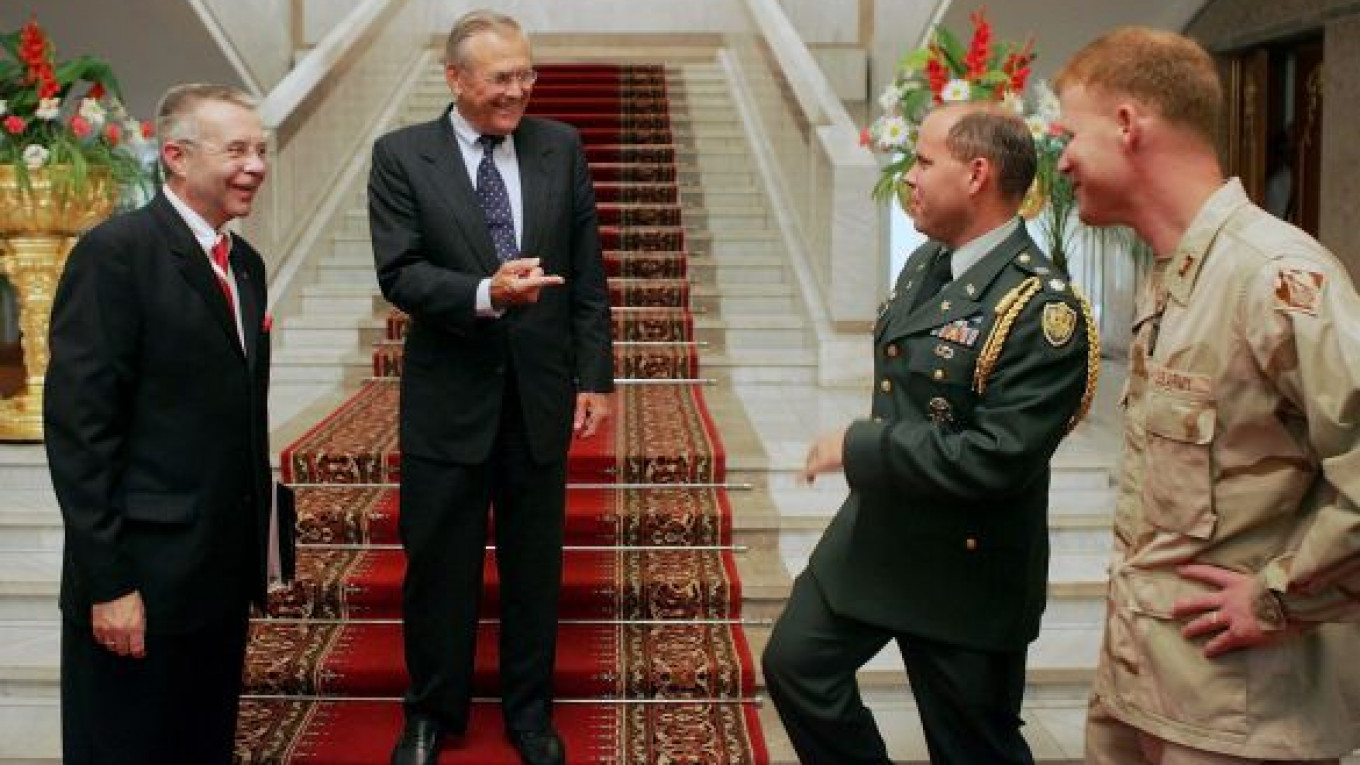WASHINGTON — A diplomat's life is not just caviar and coattails. It is rubbery fish in Brussels, a nauseating revolving restaurant in Kazakhstan and an epic three-day Dagestani wedding featuring "stupendous" quantities of alcohol, a golden pistol, dancing women, the scent of danger and cauldrons of cows boiled whole.
It is not all receptions and speeches. It also is the psychological terror of getting a phone call saying your spouse has died in an accident, but not really. A diplomat's life also can be a rather exasperating conversation with a British prince who lords it over everyone in the room.
The secret cables surfacing in the WikiLeaks disclosures offer myriad glimpses into the world of diplomacy, that oh-so-guarded enterprise.
U.S. diplomats, it turns out, are not stuffy at all. They are raconteurs, adventurers and under-the-radar operatives. Some may even be spies.
Think of the rapier wit of James Bond, the gravity of John Adams in the Court of St. James and the groovy antics of Austin Powers.
Together, the cables suggest the former Soviet Union is party central. Oil wealth, corruption, an intimidating security service, oligarchies and hearty appetites for hedonism make for a potent brew in Russia and the republics that split away.
And U.S. Embassy officials, known in cable-speak as emboff, are flies on the wall.
They shadowed the Kazakh prime minister as he danced with abandon at a nightclub (''Emboff lingered close to Masimov's group"). They reported having "eyes on" a defense minister who liked to loosen up in the "'homo sovieticus' style — i.e., drinking oneself into a stupor." They strolled not just the palaces and villas of those in government but the hideaway mansions of the political elites who really pull the strings.
For sheer voyeurism, it is hard to top a cable signed by William Burns, now a top State Department official, when he was ambassador to Russia. The cable reported from a lavish August 2006 wedding at the summer home of the chief of Dagestan's oil company in the North Caucasus, a compound where the entire floor of a grotto is the glass ceiling of a massive aquarium. (No word on sharks circling underneath.)
In marrying his son to a classmate, oilman Gadzhi Makhachev presided over a bizarre affair drawing together revelers from the wilds and from the establishment — "the slick to the Jurassic," as the cable put it. Chechen President Ramzan Kadyrov, who came with a small army, danced "clumsily with his gold-plated automatic stuck down in the back of his jeans," and joined the host in showering children with $100 bills before disappearing into the night.
The unidentified U.S. diplomats in attendance inadvertently insulted a drunken security service colonel when they would not let him add cognac to their wine, despite his protestation that "it's practically the same thing."
"We were inclined to cut the Colonel some slack," says the cable. "He is head of the unit to combat terrorism in Dagestan, and Gadzhi told us that extremists have sooner or later assassinated everyone who has joined that unit."
It was all in a day's work for diplomats seeking to understand the politics of clan, alliance, land and ethnicity, as the cable described the currents coursing through the party.
Just as an army marches on its stomach, food is the fuel of diplomacy. In Dagestan, that meant watching fragments of boiled carcasses dumped on a table for the guests.
For Richard Hoagland, ambassador to Kazakhstan, it meant meeting his Chinese counterpart for dinner in a fancy hotel built by China's national petroleum company in Astana. The Chinese ambassador preferred to talk in a public place or the U.S. Embassy because he feared his own quarters were bugged.
America's eyes and ears at that June 2009 meeting soaked up the architecture, the menu and much else. America's belly, though, was a bit wobbly that day.
"The marble lobby is impressive, if a bit too totalitarian-austere," said the cable signed by Hoagland. "We were the only guests in the restaurant, although an untouched full buffet was laid out. The revolving restaurant provides a spectacular panorama of Astana, and the empty steppe beyond, but it seems to revolve at varying speeds and sometimes can be a bit too fast on a full stomach and after a few glasses of wine."
In Kyrgyzstan, the top U.S. diplomat joined a hotel brunch in October 2008 to brief British royalty, Andrew the Duke of York, before his meetings with local officials. Ambassador Tatiana Gfoeller's cable barely conceals annoyance with the prince.
"Astonishingly candid, the discussion at times verged on the rude (from the British side)," it says. As with the other cables, it is signed by the ambassador but appears to have been written by a lower-level diplomat at the event.
Andrew is diplomatically described as "super-engaged" as he rails about British anti-corruption investigators interfering with business deals, curses journalists for poking their noses into everything, and displays "almost neuralgic patriotism" whenever the United States and Britain come up in the discussion.
"The Americans don't understand geography," the cable quotes him as saying. "Never have. In the U.K., we have the best geography teachers in the world!" The prince talked so much the meeting went twice as long as planned.
The life of a diplomat is one of risk, too.
More than 200 Americans have died in diplomatic service, starting with William Palfrey, lost at sea in 1780. They have perished from disease, murder, natural disasters and from trying to save others.
Danger always lurks in the age of terrorism, just as in all times of war and calamity. But diplomats have to watch their backs everywhere.
A November 2009 cable signed by John Beyrle, now ambassador to Russia, set the scene for FBI Director Robert Mueller before his visit with law enforcement and security counterparts. It sketched a growing climate of harassment of U.S. diplomats by elements of the Federal Security Service, or FSB.
"Family members have been the victims of psychologically terrifying assertions that their USG [U.S. government] employee spouses had met accidental deaths," the embassy reported. "Home intrusions have become far more commonplace and bold, and activity against our locally engaged Russian staff continues at a record pace.
"We have no doubt that this activity originates in the FSB. Counterintelligence challenges remain a hallmark of service at Embassy Moscow."
Decades earlier, the cables show, U.S. diplomats in Tehran tried to comprehend the Iranian revolution in its earliest throes and explain to Washington the near impossibility of reasoning with Iranians.
Bruce Laingen, charge d'affaires, signed a biting critique of what he saw as the Iranian mindset, contending "statements of intention count for almost nothing," "the single dominant aspect of the Persian psyche is an overriding egoism," "cultivation of goodwill for goodwill's sake is a waste of effort," and the "almost total Persian preoccupation with self … leaves little room for understanding points of view other than one's own."
Laingen was on to something: impending trouble. A few months after, ideologues overran the embassy and diplomats lived the lives of hostages for 444 days.
A Message from The Moscow Times:
Dear readers,
We are facing unprecedented challenges. Russia's Prosecutor General's Office has designated The Moscow Times as an "undesirable" organization, criminalizing our work and putting our staff at risk of prosecution. This follows our earlier unjust labeling as a "foreign agent."
These actions are direct attempts to silence independent journalism in Russia. The authorities claim our work "discredits the decisions of the Russian leadership." We see things differently: we strive to provide accurate, unbiased reporting on Russia.
We, the journalists of The Moscow Times, refuse to be silenced. But to continue our work, we need your help.
Your support, no matter how small, makes a world of difference. If you can, please support us monthly starting from just $2. It's quick to set up, and every contribution makes a significant impact.
By supporting The Moscow Times, you're defending open, independent journalism in the face of repression. Thank you for standing with us.
Remind me later.






